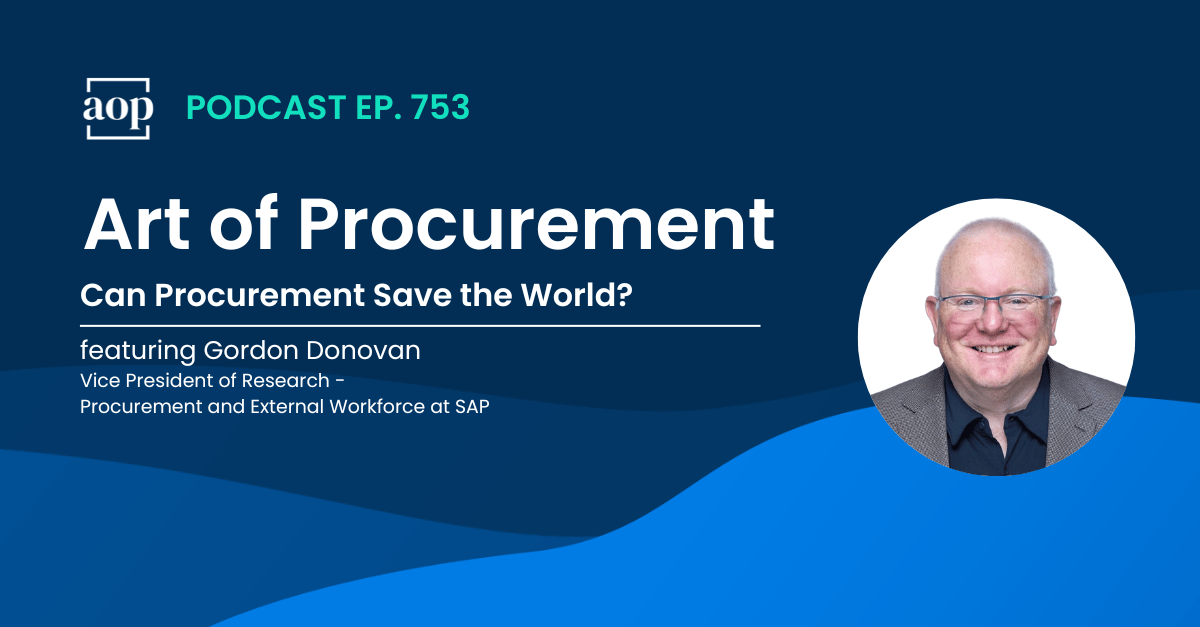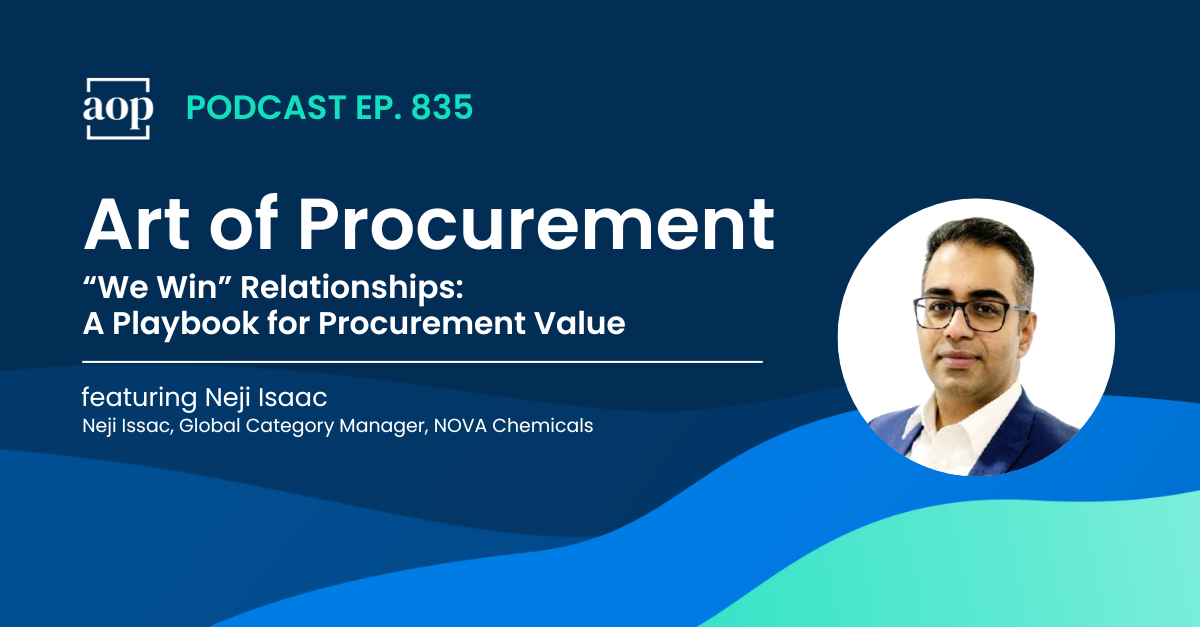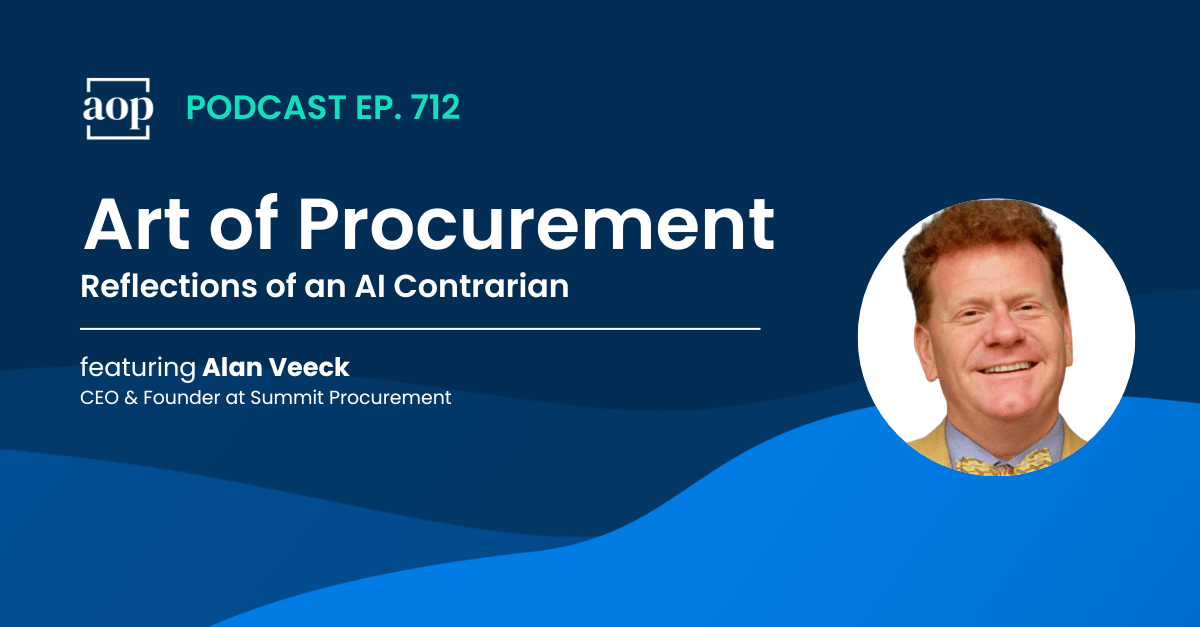
“There are not many functions, if any, other than procurement that sit in a position to both positively and negatively have such an impact on organizations, on strategy, on direction.” – Gordon Donovan
If you look at procurement veteran and longtime friend of AOP Gordon Donovan’s LinkedIn profile, his headline says it all: “Procurement can save the world.”
I recently had an opportunity to sit down with Gordon, who’s a longtime friend of the AOP podcast, and hear him make his case – in person – for procurement’s world-saving capabilities. He didn’t disappoint.
Rather than recap the best takeaways from our conversation, it’s always a good idea to let Gordon – a prolific communicator and passionate procurement advocate – speak for himself.
Here, in Gordon’s own words, are some of the highlights from our conversation, which spanned from AI and the labor force to risk management, relationship building, and procurement’s ever evolving role in the future of the global supply chain. All of which, says Gordon, situates procurement squarely at the center of an organization’s (and maybe even the world’s?) success or failure.
Procurement Can Move Mountains Markets
“Procurement has the ability to choose who they contract with that can positively impact the world in terms of supplier diversity, sustainability, and ESG goals. … Procurement has the ability to save the world because it can choose to intermediate into certain markets, and it can choose to do something to physically change those markets.”
The Evolution From Price-Aware to Total Cost
“The former CEO of Ford once said that at least 70 percent of innovation in Ford’s vehicles comes from suppliers. Procurement can sit at the juncture of the buyer-supplier interface and can positively impact that, and can negatively impact that as well. And so that’s what I mean, it can save the world.
Procurement has the ability to do so much, to be so broad, to have an agenda that’s not singularly focused on a cost or a price, and I do see that evolving. I see the evolution from price-aware to cost-aware to total cost.”
Going “Glocal”
“Many organizations are either through wanting to or having to think significantly more locally about their supply. That has a huge impact, because almost by definition, if we’re looking at more local supplies, you’re automatically looking at more diverse suppliers, because you’re going to have to.
It also means that you’re breaking apart an awful lot of traditionally bundled events, either categories or subcategories, because you don’t have the capability or the capacity in local supply chains to meet that entire need. So procurement can save the world by doing that, because that’s going to drive an awful lot of diversity, and what that will mean is that instead of it being a target of diversity, it actually means that it’s an impact of diversity.”
Procurement Is a Risk Function
“I truly believe that procurement is a risk function. We see that reporting lines are changing, and as reporting lines change and operating models change, that actually the breadth of what is getting involved changes and evolves as well. Instead of it being singularly focused on cost, it becomes much more risk aware.
I think the world is significantly more risky than it was from a global supply chain perspective, and so procurement is at the junction of that. It’s a very long-winded way of saying, I think that there’s so many ways that procurement can positively, if done well, and let’s be clear, negatively, if done badly, can impact the world.”
Addressing Cost as a Risk
“If you want to understand how to take cost out, then it’s not so much about bringing cost down, it’s more cost out. It’s about re-engineering processes, re-engineering different parts of the supply chain, about understanding the value that each part brings and deciding is that value, can I change the nature of that component to get a better outcome?”
What Does Building “Trust” Really Mean?
“Supply chain visibility is something that I think is important and people are still talking about it. The key to it is improving relationships with suppliers, and collaboration with your tier one and tier two suppliers. You have to build trust.
That goodwill trust is going to get you supply chain visibility, because they’re going to be much more willing to work with you in an open and collaborative way, because both parties have got the opportunity of behaving opportunistically, but neither party is choosing to do so.
That’s the definition, the ultimate definition for me, of trust: if you know that both bodies can exploit you, but choose not to do so. Right there, you’ve got a really good partnership.”
Categories Depend on Relationships
“I think one of the things that gives me hope is the strategic nature of what category management is, but can be, is recognizing and almost the morphing of category management and supply relationship management together. You need to, in order to write a good category strategy, you’ve got to understand the nature of the relationship with the suppliers you have and that you actually want, and start to think about how you’re going to improve the relationship health.”
In the Age of AI, This Skill is More Important Than Ever
“AI is going to change the skill sets that people are going to need. One of the top skill sets that CPOs are looking for, is curiosity, intellectual curiosity. So many people that I speak to say ‘I just want people who are curious.’
Especially when you think about how we use AI, generative AI, to augment various things. You’re going to need people who aren’t just going to take what AI tells you but who are going to be curious about it to start asking questions about where it comes from to validate it.
So the curiosity piece is very important.”
Subscribe to Art of Procurement
Apple | Stitcher | iHeart Radio | Email



.png)
